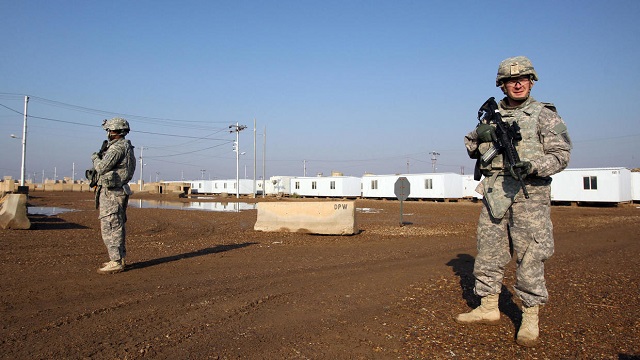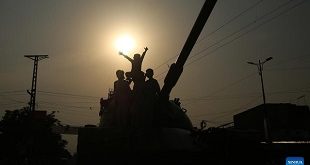
Baghdad, Iraq | AFP | When it invaded in 2003, the United States promised “Iraqi freedom,” democracy, and prosperity. But 17 years later, its troops may be ousted from a country beset by just the opposite.
After a parliamentary vote earlier this month, Iraq’s government is preparing to order foreign forces out of the country in retaliation for the US killing of top Iranian and Iraqi commanders in a surprise drone strike in Baghdad.
Analysts say the troops would leave behind a country with inefficient institutions and rampant corruption, sectarian politics and cities still flattened by bombardment.
“It’s an unmitigated failure” of long-term US planning for Iraq, said Karim Bitar, a Middle East expert at the Paris-based Institute for International and Strategic Affairs, adding: “It was rotten from the beginning.”
He said the US-crafted Iraqi constitution, which formalised power-sharing across religions and ethnicities, had deepened divisions.
The 2005 document was meant to be the foundation of a state of institutions — but it leaves more questions unanswered.
What happens to lands claimed by both the federal and autonomous Kurdish governments? The constitution leaves it to be resolved at a later time.
What if the prime minister resigns? The document left out provisions for that — which prompted a legal crisis when current caretaker premier Adel Abdel Mahdi stepped down in December.
Many key laws were never properly legislated, leaving loopholes for strongmen to pursue their own interests.
“The constitution is constantly violated,” an Iraqi government official even admitted.
– ‘Biggest strategic error’
The other pillar of a democratic system — the ballot box — has not fared much better.
“Elections meant to be a model for others have turned to community consensus,” Bitar told AFP, as parties trade and buy votes instead of truly campaigning.
A wave of recent anti-government rallies have called for an overhaul of the voting system but when the current 329-member parliament — elected in May 2018 — passed amendments last month, they contradicted protester demands.
The demonstrations have also slammed widespread graft among state institutions, which often make hiring decisions based on nepotism or bribery, not competency.
Iraq’s own Integrity Commission publishes near-daily updates on the millions of dollars siphoned off by government officials in recent years.
US companies working in Iraq since the invasion have been repeatedly accused of bribing government officials to get contracts worth billions of dollars.
And while Washington has repeatedly urged US firms to invest more in Iraq to expand the private sector, it also maintains American nationals should never travel there because of ongoing instability.
Indeed, a majority of the 17 years since the US invasion have been bloody, marred by an anti-American insurgency, sectarian warfare and the rise of jihadists.
Bitar traced the instability back to a single US decision: dissolving the Iraqi army in 2003.
“It was the biggest strategic error, a dangerous parallel to the de-Nazification of Germany after World War II,” he said.
The vacuum left hundreds of thousands of Iraqi men angry and armed, and allowed militias to flourish and impose their rule — including the Islamic State group in 2014.
– ‘Want to live free’ –
IS, which included ex-members of Saddam’s army, was then fought by the Hashed al-Shaabi, a network of Shiite armed groups that have now been incorporated into the state.
Saddam’s soldiers, IS jihadists and Hashed factions have all been opposed by the US, but the last of the three is now proving to be a massive thorn in Washington’s side.
The US sees the Hashed as the Iraqi extension of Iran, which the administration considers its regional foe.
“What America has not done is translate the military strength into political leverage,” said Fanar Haddad, an expert at the National University of Singapore’s Middle East Institute.
The US had long prioritised Iraq’s stability over real democracy and state-building, he said, which ultimately led to “the failure of the American project in Iraq.”
Now, Iraq is threatening to oust foreign forces from its soil, including 5,200 US troops.
Washington insists troops will stay, despite a controversial letter from a top US defence official in Baghdad saying forces were preparing to “move out.”
US President Donald Trump said an ouster would prompt devastating sanctions on Iraq, whose officials countered that would only send Baghdad further into Tehran’s orbit.
The war-of-words has eclipsed the protest movement, whose young activists were mostly born just before 2003 and have called for, among other things, “Iraqi freedom.”
And as protesters have slammed Iran for holding too much sway in Iraq, they have also hinted at another desire: a return to the presidential system in place under Saddam.
“We used to have one dictator. Now we have a lot of small dictators,” said one protester in Baghdad’s Tahrir Square, where demonstrators have begun holding big banners that read, “No to Iran, No to the US!”
“We just want to live free,” the protester added.
 The Independent Uganda: You get the Truth we Pay the Price
The Independent Uganda: You get the Truth we Pay the Price



